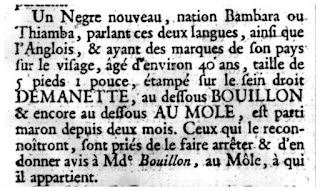Samba, runaway "Bambara" in 1767. Samba as first name may be more indicative of a Fula or perhaps other Senegalese origin. Actual "Bambara" origins may be more likely when paired with a description of runaway slaves bearing evidence of facial scarification.
Part of the problem with gathering precise information on "Bambara" captives in Saint-Domingue is that the French themselves didn't seem to know much about them. They appear to have learned that there was indeed a "Bambara" language but runaway ads like the one above express confusion. We suspect "Mandingue" was meant instead of Bambara, particularly since Mandingues and Bambaras spoke related tongues.
Yet another example of the ambiguity of "Bambara" and other nations in Saint-Domingue. If the Tacoua were Nupe, then it seems unlikely for a Nupe person to speak "Bambara." If "Bambara" here is interpreted broadly as a Mande-related language, then it is possible for a Nupe woman to have also spoken or learned a language related to "Bambara." But it raises questions about the accuracy of labels like "Tacoua" and "Bambara" in the colony.
Another example of the ambiguity or perhaps broad meaning of "Bambara" can be seen in the case of a runaway named Fevrier. His nation, Saufo, probably Soso (Susu), a group present in the colony in larger numbers than we think, is described as a "type of Bambara." This suggests any group of peoples speaking languages similar to Bamana and probably non-Muslim could become a "Bambara."
Another ad for a runaway includes someone who spoke both Bambara and Thiamba. If Thiamba referred to the broader cluster of Gur peoples, then it is possible this man spoke Mandingue or Bambara.
Even free blacks in Saint-Domingue called themselves Bambara. The case of Jacques dit Bambara is an interesting one, since he owned slaves and property near Mirebalais.






.jpg)

No comments:
Post a Comment